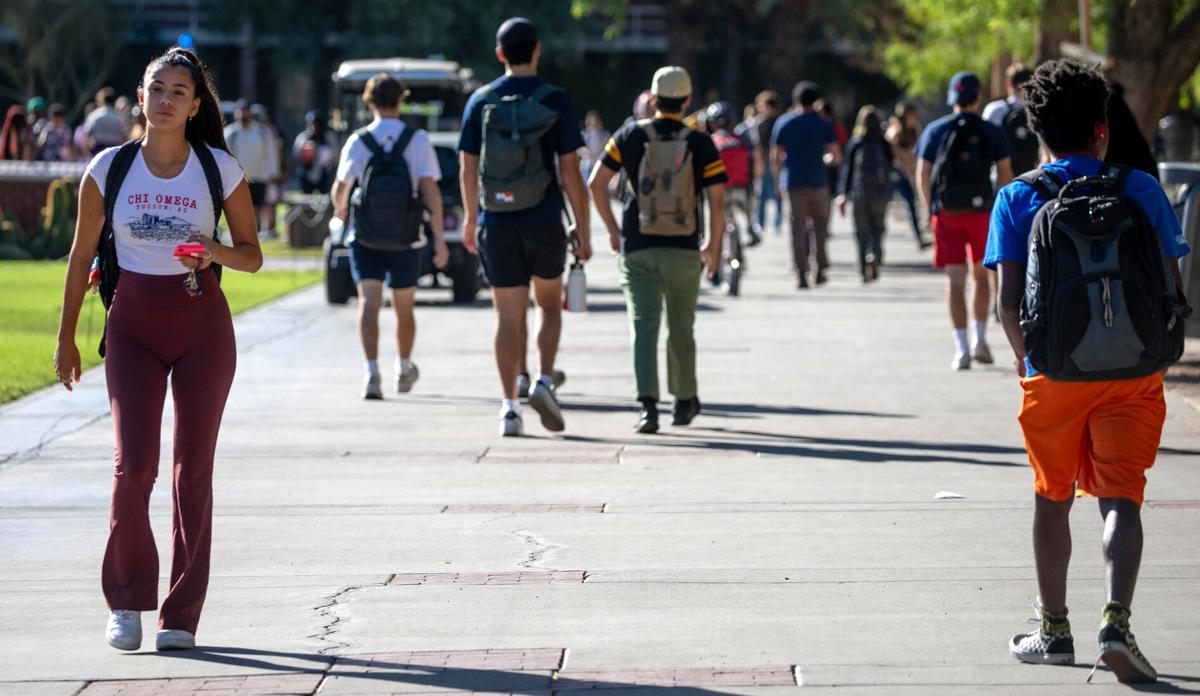A new requirement at the University of Arizona mandating students take courses centered around diversity and equity in order to graduate could soon be facing a legal challenge.
The school launched the diversity and equity requirement, called an attribute, in 2020. Starting in fall 2024, undergraduate students must fulfill the new general education requirement, studying “how historical and contemporary populations have experienced inequality, considering diversity, power, and equity through disciplinary perspectives,” according to the university’s website.
Students will be required to take two courses in the attribute, with one focusing on the U.S. specifically. These classes can usually be found in humanities disciplines.
The conservative think tank, Goldwater Institute, thinks the new mandate is “discriminatory” and possibly illegal. The Arizona-based group has filed a public records request with the UA seeking all information on training materials for diversity and inclusion training for faculty and staff as well as the provost’s office, and copies of all course syllabi and reading lists for the university’s diversity and equity attributed courses, according to a spokesman for the organization.
Joe Setyon, the senior communications manager at the Goldwater Institute, cited state law 41-1494 as the reason for the FOIA request. The law mandates that government funded entities like the UA cannot place “blame of judgement on the basis of race, ethnicity, or sex,” including stating that one group is “inherently morally or intellectually superior” or that an individual, because of their race, ethnicity, or sex is “inherently racist, sexist, or oppressive, whether consciously or unconsciously.”
The think tank believes the new attribute may do just that.
“Across the country, a web of taxpayer-funded, racially discriminatory initiatives is seeping into every aspect of university life, from faculty hiring to faculty training to classroom indoctrination,” Setyon wrote in an email. “And it is all happening under the guise of diversity, equity and inclusion. But under Arizona state law, the government cannot spend taxpayer money on trainings that ‘present any form of blame or judgment on the basis of race, ethnicity or sex.’ “
The university-wide general education committee approved a new curriculum that included the diversity and equity attribute in December 2020. The attribute was then approved by the undergraduate council in March 2021, the faculty senate that April, and approved by the Arizona Board of Regents (ABOR) two months later in June, according to Susan Miller-Cochran, executive director of general education at the UA.
“By exploring diversity and equity both within a US context and across the globe, I hope that students are able to understand a range of perspectives, aligning with the goals of our general education program,” said Miller-Cochran, who is also an English professor.
Professors that teach the attribute expressed enthusiasm for the lessons it provides.
“If we have a better educated public, not only do we have citizens who are more productive, but we have a more tolerant society with less violence,” said Anna O’Leary, the head of the Mexican American studies department at the university. “Having [and understanding] a multicultural society is good for society.”
O’Leary, who has been at the university for 20 years, teaches a class of about 50 students called Culture, Community and Identity, which fits under the diversity and equity attribute.
“It is important for me to make sure that the perspective of Mexican Americans comes out in our teaching and understanding of the larger American narrative,” she said. “There’s some people who think there’s only one history when in fact there are several.”
Last spring, the Goldwater Institute successfully pushed through state reforms in Texas and Florida that banned DEI offices and other diversity-centered policies in higher education.
The governors in both states share many of the same conservative beliefs as the institute, while Arizona Governor Katie Hobbs has pledged her support for diversity efforts. Most recently, she announced the establishment of a diversity, equity, inclusion and accessibility council to work with state agencies to promote equity within the government.
The Goldwater Institute previously found success when it lobbied the state legislature to drop diversity statements from job postings at public universities. Last month they also attacked Arizona State University for their diversity training, though the university has remained committed to their policies.
“We intend to hold Arizona’s public university system accountable to ensure that administrators do not illegally conduct racially discriminatory trainings,” Setyon wrote.
Miller-Cochran, the executive director of general education at UA, pushed back against the criticism, emphasizing that the attribute aligns with ABOR policies and said that the classes provide flexibility for students.
“We have a broad range of courses that have the [diversity and equity] attribute that students can choose from,” she said. “They are not required to take any specific course, and we have focused on preserving student autonomy is selecting classes whenever possible in the new curriculum.”
Miller-Cochran also specifically pointed to an ABOR general education policy that includes “clear and direct education around questions related to ethics, civility, diversity, and inclusion.”
Tom Christiano teaches a philosophy course that falls under the diversity and equity attribute called Freedom, Equality and Authority. He hopes this spring’s class will include about 100 students, who will read everything from Adam Smith to Karl Marx in order to study the nature of political authority and economic exchange.
“One of the main things [the course] is about is the question of inequality; whether it can be justified or not justified,” he said. “We also talk about race; we talk a little bit about sexism, and we talk a little bit about identity. We have differing points of view.”
Christiano has been at the university for 33 years and believes that his students take away a lot from the diversity and equity attributed class.
“They get an appreciation that the other is a variety of opinions, and there are good arguments on different sides,” he said. “Even if I think my argument is the right one, I can see why these other people have the views that they have.”





